Comprehensive Report: Health and Social Care Needs and Services
VerifiedAdded on 2020/09/03
|12
|3540
|44
Report
AI Summary
This report provides a comprehensive overview of specific needs in health and social care, addressing concepts of disability, illness, and behavior within the context of service users. It examines how perceptions of these needs have evolved over time, considering the impact of social policies, practices, legislation, and cultural factors on service availability. The report includes an essay on understanding these concepts, a case scenario exploring care needs and available services in a chosen locality, a booklet on intervention strategies, and a case study analyzing changing behavior in a learning disability clinic. It also explores the effectiveness of various approaches, technological advancements, and the effects of challenging behavior on healthcare organizations, offering strategies for supporting clients with specific needs. The report highlights the importance of tailored care, effective communication, and the role of legislation in ensuring equal opportunities and improved health outcomes for individuals with diverse needs.
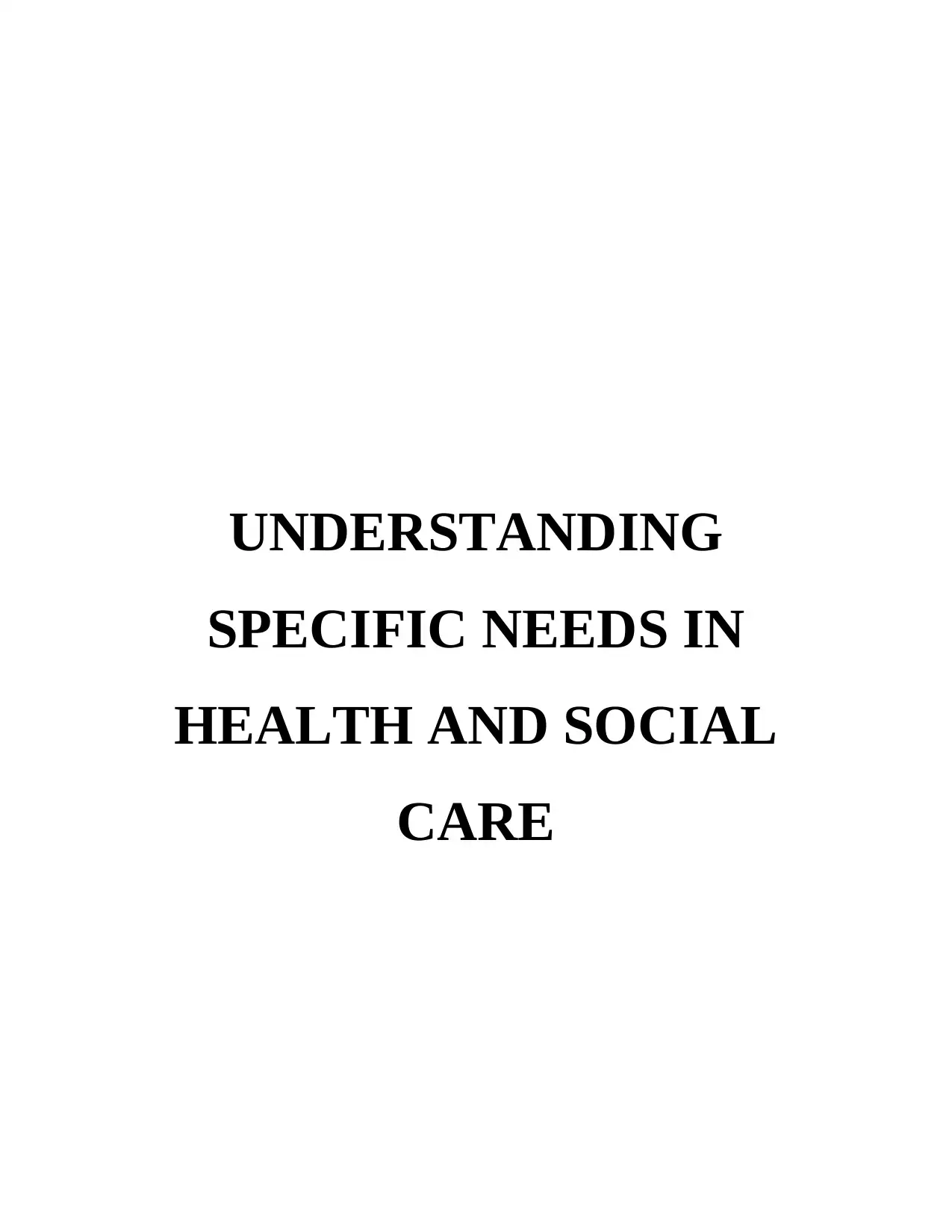
UNDERSTANDING
SPECIFIC NEEDS IN
HEALTH AND SOCIAL
CARE
SPECIFIC NEEDS IN
HEALTH AND SOCIAL
CARE
Paraphrase This Document
Need a fresh take? Get an instant paraphrase of this document with our AI Paraphraser
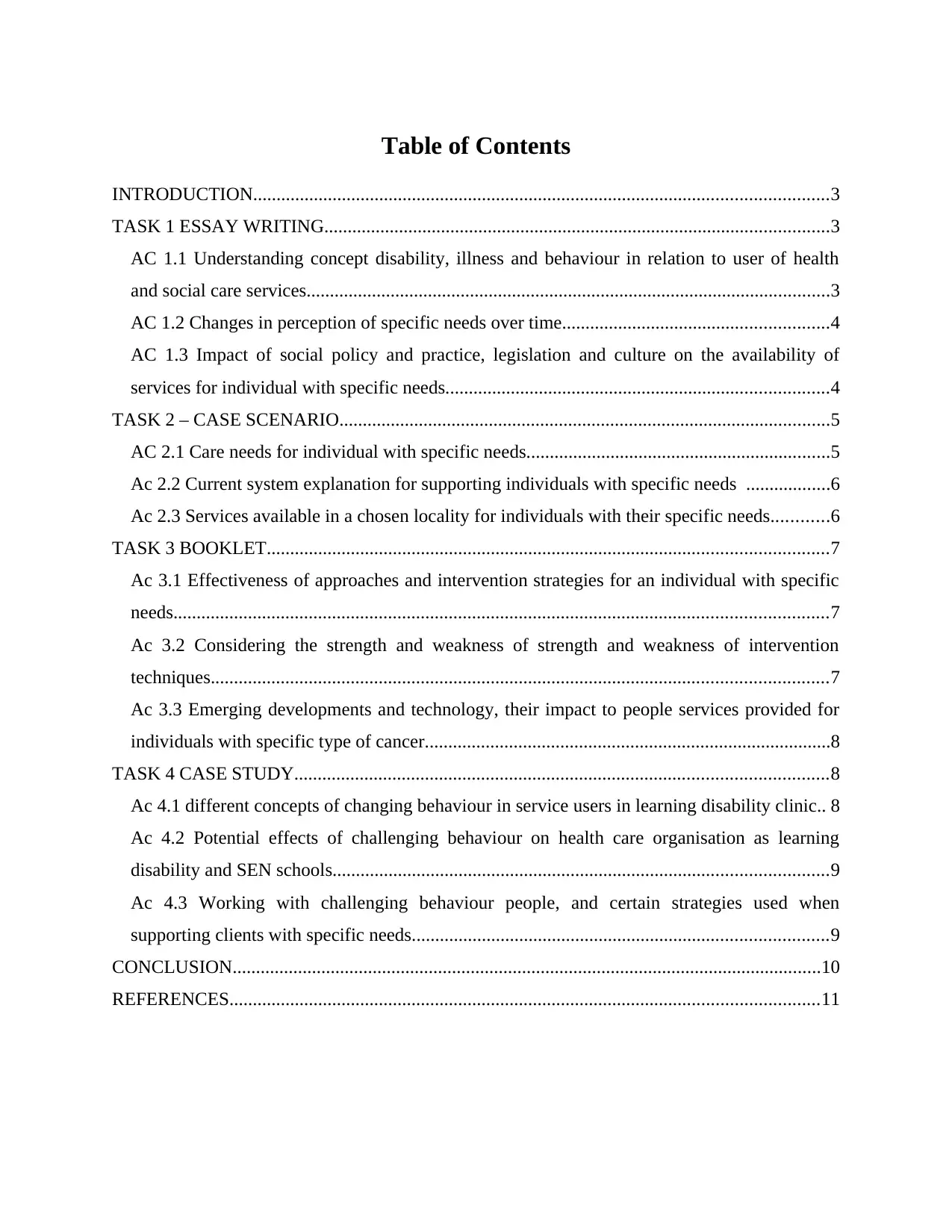
Table of Contents
INTRODUCTION...........................................................................................................................3
TASK 1 ESSAY WRITING............................................................................................................3
AC 1.1 Understanding concept disability, illness and behaviour in relation to user of health
and social care services................................................................................................................3
AC 1.2 Changes in perception of specific needs over time.........................................................4
AC 1.3 Impact of social policy and practice, legislation and culture on the availability of
services for individual with specific needs..................................................................................4
TASK 2 – CASE SCENARIO.........................................................................................................5
AC 2.1 Care needs for individual with specific needs.................................................................5
Ac 2.2 Current system explanation for supporting individuals with specific needs ..................6
Ac 2.3 Services available in a chosen locality for individuals with their specific needs............6
TASK 3 BOOKLET........................................................................................................................7
Ac 3.1 Effectiveness of approaches and intervention strategies for an individual with specific
needs............................................................................................................................................7
Ac 3.2 Considering the strength and weakness of strength and weakness of intervention
techniques....................................................................................................................................7
Ac 3.3 Emerging developments and technology, their impact to people services provided for
individuals with specific type of cancer.......................................................................................8
TASK 4 CASE STUDY..................................................................................................................8
Ac 4.1 different concepts of changing behaviour in service users in learning disability clinic.. 8
Ac 4.2 Potential effects of challenging behaviour on health care organisation as learning
disability and SEN schools..........................................................................................................9
Ac 4.3 Working with challenging behaviour people, and certain strategies used when
supporting clients with specific needs.........................................................................................9
CONCLUSION..............................................................................................................................10
REFERENCES..............................................................................................................................11
INTRODUCTION...........................................................................................................................3
TASK 1 ESSAY WRITING............................................................................................................3
AC 1.1 Understanding concept disability, illness and behaviour in relation to user of health
and social care services................................................................................................................3
AC 1.2 Changes in perception of specific needs over time.........................................................4
AC 1.3 Impact of social policy and practice, legislation and culture on the availability of
services for individual with specific needs..................................................................................4
TASK 2 – CASE SCENARIO.........................................................................................................5
AC 2.1 Care needs for individual with specific needs.................................................................5
Ac 2.2 Current system explanation for supporting individuals with specific needs ..................6
Ac 2.3 Services available in a chosen locality for individuals with their specific needs............6
TASK 3 BOOKLET........................................................................................................................7
Ac 3.1 Effectiveness of approaches and intervention strategies for an individual with specific
needs............................................................................................................................................7
Ac 3.2 Considering the strength and weakness of strength and weakness of intervention
techniques....................................................................................................................................7
Ac 3.3 Emerging developments and technology, their impact to people services provided for
individuals with specific type of cancer.......................................................................................8
TASK 4 CASE STUDY..................................................................................................................8
Ac 4.1 different concepts of changing behaviour in service users in learning disability clinic.. 8
Ac 4.2 Potential effects of challenging behaviour on health care organisation as learning
disability and SEN schools..........................................................................................................9
Ac 4.3 Working with challenging behaviour people, and certain strategies used when
supporting clients with specific needs.........................................................................................9
CONCLUSION..............................................................................................................................10
REFERENCES..............................................................................................................................11
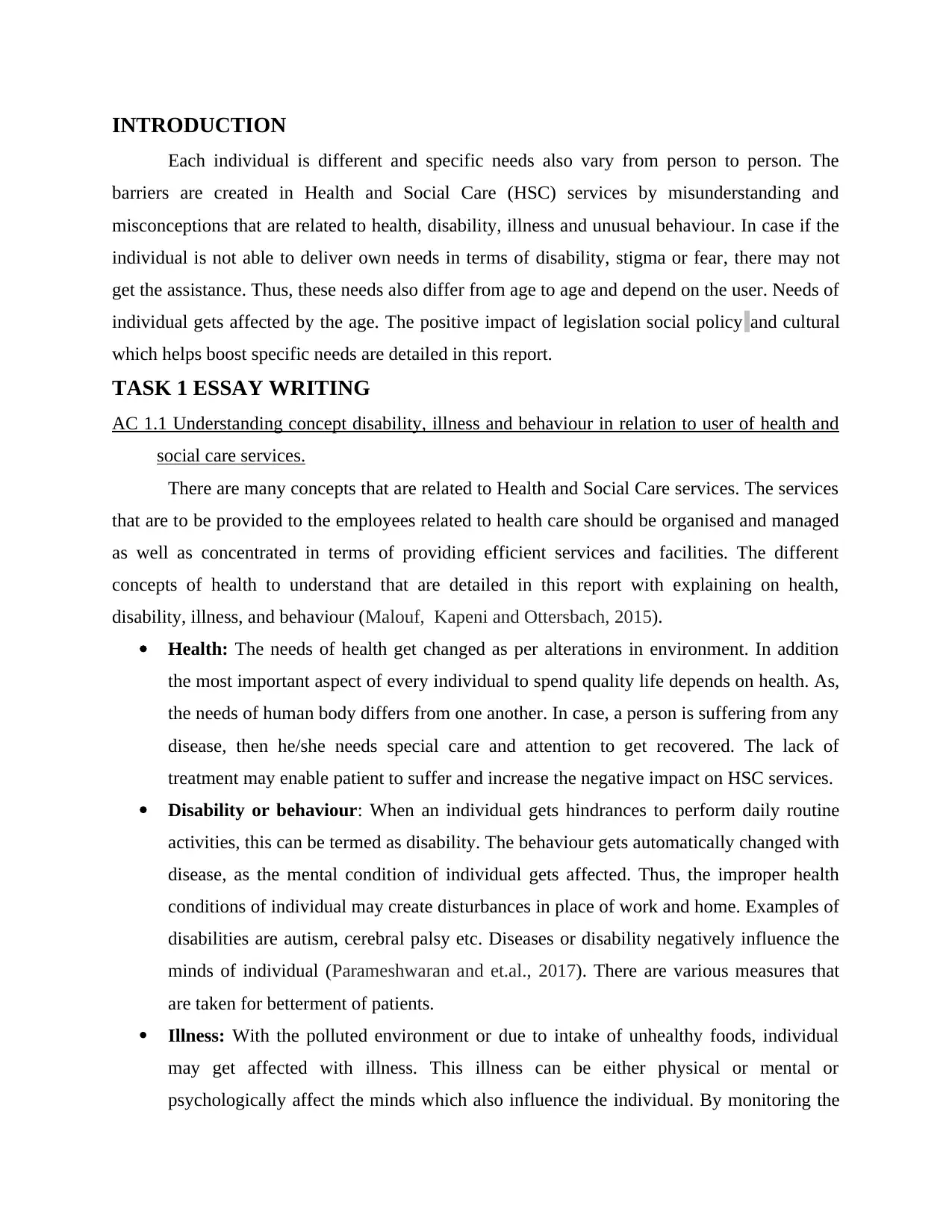
INTRODUCTION
Each individual is different and specific needs also vary from person to person. The
barriers are created in Health and Social Care (HSC) services by misunderstanding and
misconceptions that are related to health, disability, illness and unusual behaviour. In case if the
individual is not able to deliver own needs in terms of disability, stigma or fear, there may not
get the assistance. Thus, these needs also differ from age to age and depend on the user. Needs of
individual gets affected by the age. The positive impact of legislation social policy and cultural
which helps boost specific needs are detailed in this report.
TASK 1 ESSAY WRITING
AC 1.1 Understanding concept disability, illness and behaviour in relation to user of health and
social care services.
There are many concepts that are related to Health and Social Care services. The services
that are to be provided to the employees related to health care should be organised and managed
as well as concentrated in terms of providing efficient services and facilities. The different
concepts of health to understand that are detailed in this report with explaining on health,
disability, illness, and behaviour (Malouf, Kapeni and Ottersbach, 2015).
Health: The needs of health get changed as per alterations in environment. In addition
the most important aspect of every individual to spend quality life depends on health. As,
the needs of human body differs from one another. In case, a person is suffering from any
disease, then he/she needs special care and attention to get recovered. The lack of
treatment may enable patient to suffer and increase the negative impact on HSC services.
Disability or behaviour: When an individual gets hindrances to perform daily routine
activities, this can be termed as disability. The behaviour gets automatically changed with
disease, as the mental condition of individual gets affected. Thus, the improper health
conditions of individual may create disturbances in place of work and home. Examples of
disabilities are autism, cerebral palsy etc. Diseases or disability negatively influence the
minds of individual (Parameshwaran and et.al., 2017). There are various measures that
are taken for betterment of patients.
Illness: With the polluted environment or due to intake of unhealthy foods, individual
may get affected with illness. This illness can be either physical or mental or
psychologically affect the minds which also influence the individual. By monitoring the
Each individual is different and specific needs also vary from person to person. The
barriers are created in Health and Social Care (HSC) services by misunderstanding and
misconceptions that are related to health, disability, illness and unusual behaviour. In case if the
individual is not able to deliver own needs in terms of disability, stigma or fear, there may not
get the assistance. Thus, these needs also differ from age to age and depend on the user. Needs of
individual gets affected by the age. The positive impact of legislation social policy and cultural
which helps boost specific needs are detailed in this report.
TASK 1 ESSAY WRITING
AC 1.1 Understanding concept disability, illness and behaviour in relation to user of health and
social care services.
There are many concepts that are related to Health and Social Care services. The services
that are to be provided to the employees related to health care should be organised and managed
as well as concentrated in terms of providing efficient services and facilities. The different
concepts of health to understand that are detailed in this report with explaining on health,
disability, illness, and behaviour (Malouf, Kapeni and Ottersbach, 2015).
Health: The needs of health get changed as per alterations in environment. In addition
the most important aspect of every individual to spend quality life depends on health. As,
the needs of human body differs from one another. In case, a person is suffering from any
disease, then he/she needs special care and attention to get recovered. The lack of
treatment may enable patient to suffer and increase the negative impact on HSC services.
Disability or behaviour: When an individual gets hindrances to perform daily routine
activities, this can be termed as disability. The behaviour gets automatically changed with
disease, as the mental condition of individual gets affected. Thus, the improper health
conditions of individual may create disturbances in place of work and home. Examples of
disabilities are autism, cerebral palsy etc. Diseases or disability negatively influence the
minds of individual (Parameshwaran and et.al., 2017). There are various measures that
are taken for betterment of patients.
Illness: With the polluted environment or due to intake of unhealthy foods, individual
may get affected with illness. This illness can be either physical or mental or
psychologically affect the minds which also influence the individual. By monitoring the
⊘ This is a preview!⊘
Do you want full access?
Subscribe today to unlock all pages.

Trusted by 1+ million students worldwide
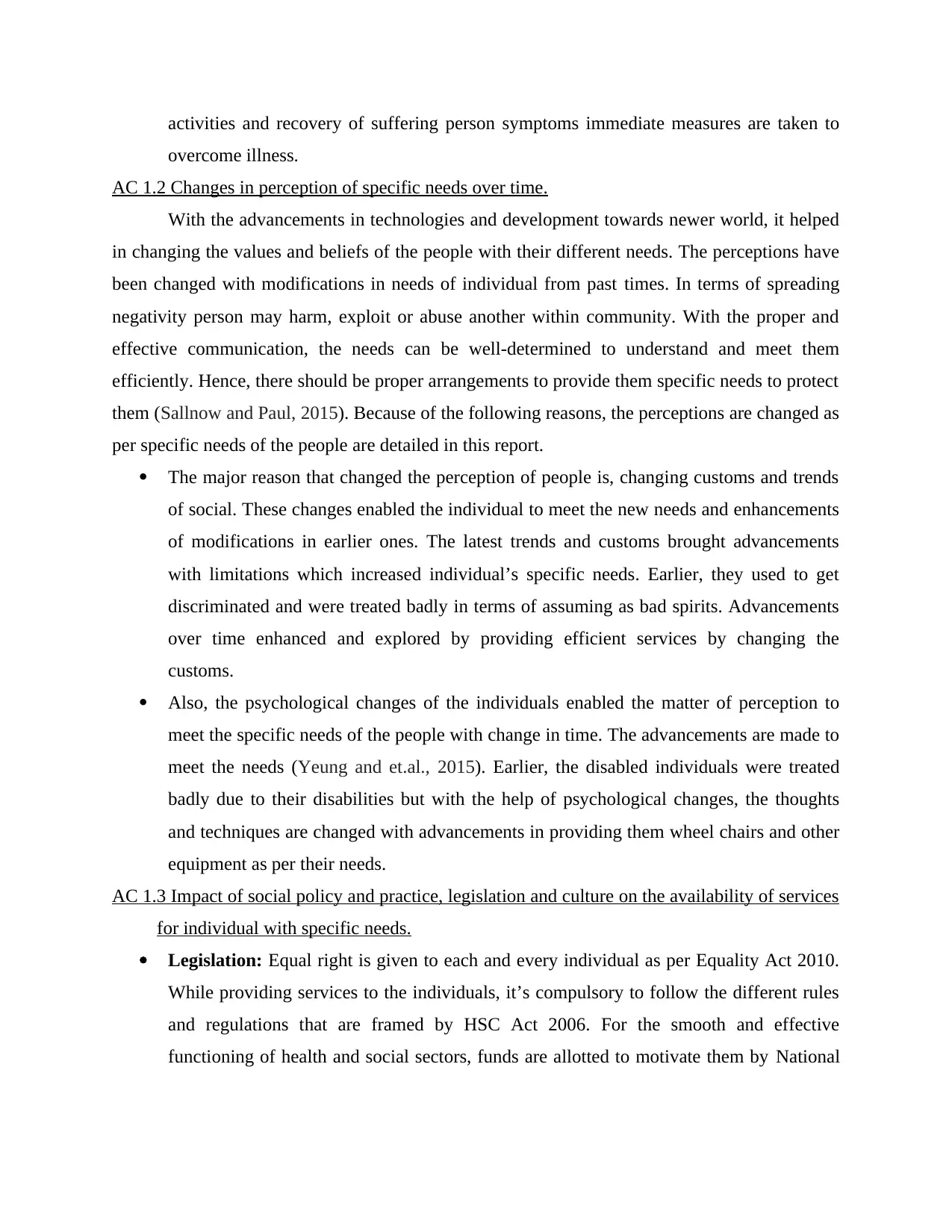
activities and recovery of suffering person symptoms immediate measures are taken to
overcome illness.
AC 1.2 Changes in perception of specific needs over time.
With the advancements in technologies and development towards newer world, it helped
in changing the values and beliefs of the people with their different needs. The perceptions have
been changed with modifications in needs of individual from past times. In terms of spreading
negativity person may harm, exploit or abuse another within community. With the proper and
effective communication, the needs can be well-determined to understand and meet them
efficiently. Hence, there should be proper arrangements to provide them specific needs to protect
them (Sallnow and Paul, 2015). Because of the following reasons, the perceptions are changed as
per specific needs of the people are detailed in this report.
The major reason that changed the perception of people is, changing customs and trends
of social. These changes enabled the individual to meet the new needs and enhancements
of modifications in earlier ones. The latest trends and customs brought advancements
with limitations which increased individual’s specific needs. Earlier, they used to get
discriminated and were treated badly in terms of assuming as bad spirits. Advancements
over time enhanced and explored by providing efficient services by changing the
customs.
Also, the psychological changes of the individuals enabled the matter of perception to
meet the specific needs of the people with change in time. The advancements are made to
meet the needs (Yeung and et.al., 2015). Earlier, the disabled individuals were treated
badly due to their disabilities but with the help of psychological changes, the thoughts
and techniques are changed with advancements in providing them wheel chairs and other
equipment as per their needs.
AC 1.3 Impact of social policy and practice, legislation and culture on the availability of services
for individual with specific needs.
Legislation: Equal right is given to each and every individual as per Equality Act 2010.
While providing services to the individuals, it’s compulsory to follow the different rules
and regulations that are framed by HSC Act 2006. For the smooth and effective
functioning of health and social sectors, funds are allotted to motivate them by National
overcome illness.
AC 1.2 Changes in perception of specific needs over time.
With the advancements in technologies and development towards newer world, it helped
in changing the values and beliefs of the people with their different needs. The perceptions have
been changed with modifications in needs of individual from past times. In terms of spreading
negativity person may harm, exploit or abuse another within community. With the proper and
effective communication, the needs can be well-determined to understand and meet them
efficiently. Hence, there should be proper arrangements to provide them specific needs to protect
them (Sallnow and Paul, 2015). Because of the following reasons, the perceptions are changed as
per specific needs of the people are detailed in this report.
The major reason that changed the perception of people is, changing customs and trends
of social. These changes enabled the individual to meet the new needs and enhancements
of modifications in earlier ones. The latest trends and customs brought advancements
with limitations which increased individual’s specific needs. Earlier, they used to get
discriminated and were treated badly in terms of assuming as bad spirits. Advancements
over time enhanced and explored by providing efficient services by changing the
customs.
Also, the psychological changes of the individuals enabled the matter of perception to
meet the specific needs of the people with change in time. The advancements are made to
meet the needs (Yeung and et.al., 2015). Earlier, the disabled individuals were treated
badly due to their disabilities but with the help of psychological changes, the thoughts
and techniques are changed with advancements in providing them wheel chairs and other
equipment as per their needs.
AC 1.3 Impact of social policy and practice, legislation and culture on the availability of services
for individual with specific needs.
Legislation: Equal right is given to each and every individual as per Equality Act 2010.
While providing services to the individuals, it’s compulsory to follow the different rules
and regulations that are framed by HSC Act 2006. For the smooth and effective
functioning of health and social sectors, funds are allotted to motivate them by National
Paraphrase This Document
Need a fresh take? Get an instant paraphrase of this document with our AI Paraphraser
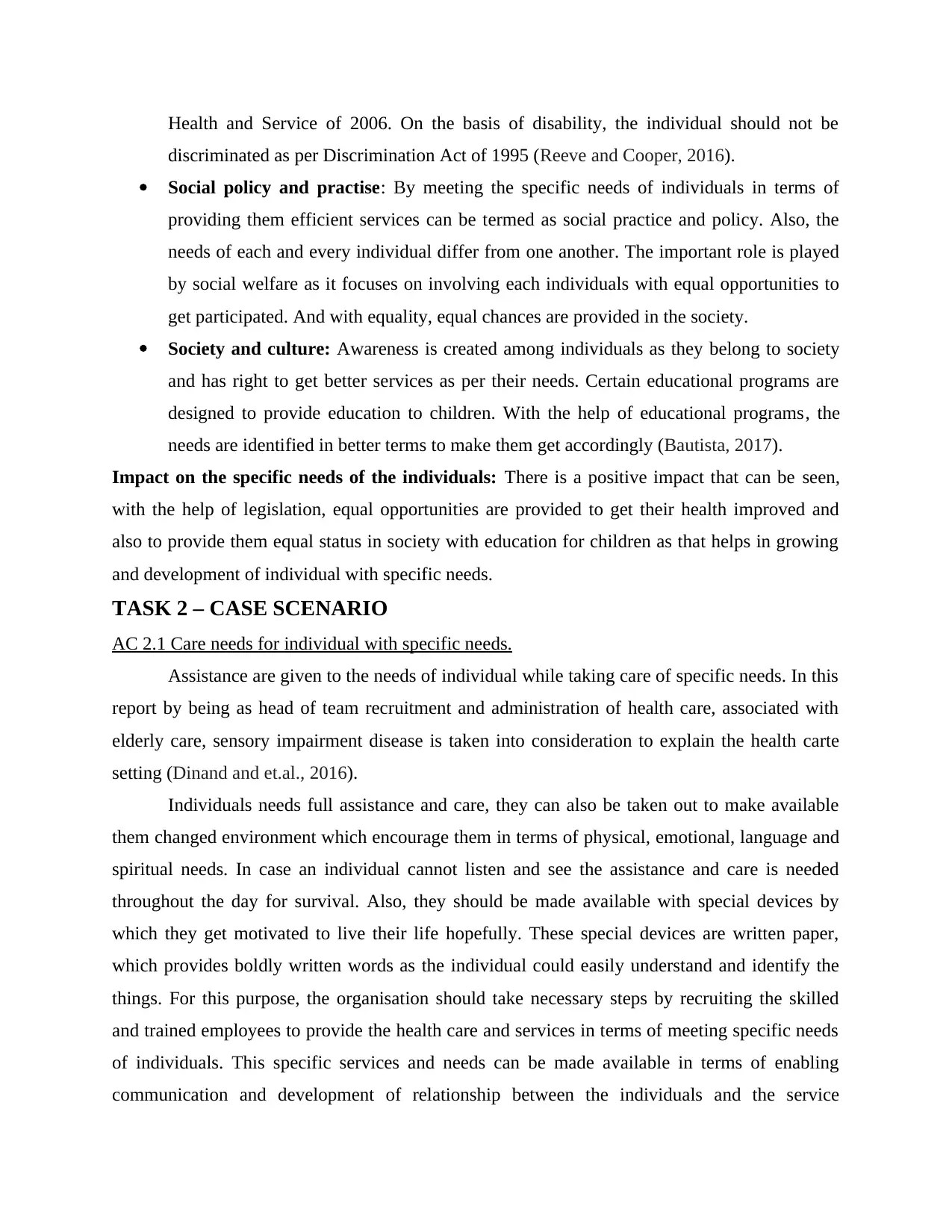
Health and Service of 2006. On the basis of disability, the individual should not be
discriminated as per Discrimination Act of 1995 (Reeve and Cooper, 2016).
Social policy and practise: By meeting the specific needs of individuals in terms of
providing them efficient services can be termed as social practice and policy. Also, the
needs of each and every individual differ from one another. The important role is played
by social welfare as it focuses on involving each individuals with equal opportunities to
get participated. And with equality, equal chances are provided in the society.
Society and culture: Awareness is created among individuals as they belong to society
and has right to get better services as per their needs. Certain educational programs are
designed to provide education to children. With the help of educational programs, the
needs are identified in better terms to make them get accordingly (Bautista, 2017).
Impact on the specific needs of the individuals: There is a positive impact that can be seen,
with the help of legislation, equal opportunities are provided to get their health improved and
also to provide them equal status in society with education for children as that helps in growing
and development of individual with specific needs.
TASK 2 – CASE SCENARIO
AC 2.1 Care needs for individual with specific needs.
Assistance are given to the needs of individual while taking care of specific needs. In this
report by being as head of team recruitment and administration of health care, associated with
elderly care, sensory impairment disease is taken into consideration to explain the health carte
setting (Dinand and et.al., 2016).
Individuals needs full assistance and care, they can also be taken out to make available
them changed environment which encourage them in terms of physical, emotional, language and
spiritual needs. In case an individual cannot listen and see the assistance and care is needed
throughout the day for survival. Also, they should be made available with special devices by
which they get motivated to live their life hopefully. These special devices are written paper,
which provides boldly written words as the individual could easily understand and identify the
things. For this purpose, the organisation should take necessary steps by recruiting the skilled
and trained employees to provide the health care and services in terms of meeting specific needs
of individuals. This specific services and needs can be made available in terms of enabling
communication and development of relationship between the individuals and the service
discriminated as per Discrimination Act of 1995 (Reeve and Cooper, 2016).
Social policy and practise: By meeting the specific needs of individuals in terms of
providing them efficient services can be termed as social practice and policy. Also, the
needs of each and every individual differ from one another. The important role is played
by social welfare as it focuses on involving each individuals with equal opportunities to
get participated. And with equality, equal chances are provided in the society.
Society and culture: Awareness is created among individuals as they belong to society
and has right to get better services as per their needs. Certain educational programs are
designed to provide education to children. With the help of educational programs, the
needs are identified in better terms to make them get accordingly (Bautista, 2017).
Impact on the specific needs of the individuals: There is a positive impact that can be seen,
with the help of legislation, equal opportunities are provided to get their health improved and
also to provide them equal status in society with education for children as that helps in growing
and development of individual with specific needs.
TASK 2 – CASE SCENARIO
AC 2.1 Care needs for individual with specific needs.
Assistance are given to the needs of individual while taking care of specific needs. In this
report by being as head of team recruitment and administration of health care, associated with
elderly care, sensory impairment disease is taken into consideration to explain the health carte
setting (Dinand and et.al., 2016).
Individuals needs full assistance and care, they can also be taken out to make available
them changed environment which encourage them in terms of physical, emotional, language and
spiritual needs. In case an individual cannot listen and see the assistance and care is needed
throughout the day for survival. Also, they should be made available with special devices by
which they get motivated to live their life hopefully. These special devices are written paper,
which provides boldly written words as the individual could easily understand and identify the
things. For this purpose, the organisation should take necessary steps by recruiting the skilled
and trained employees to provide the health care and services in terms of meeting specific needs
of individuals. This specific services and needs can be made available in terms of enabling
communication and development of relationship between the individuals and the service
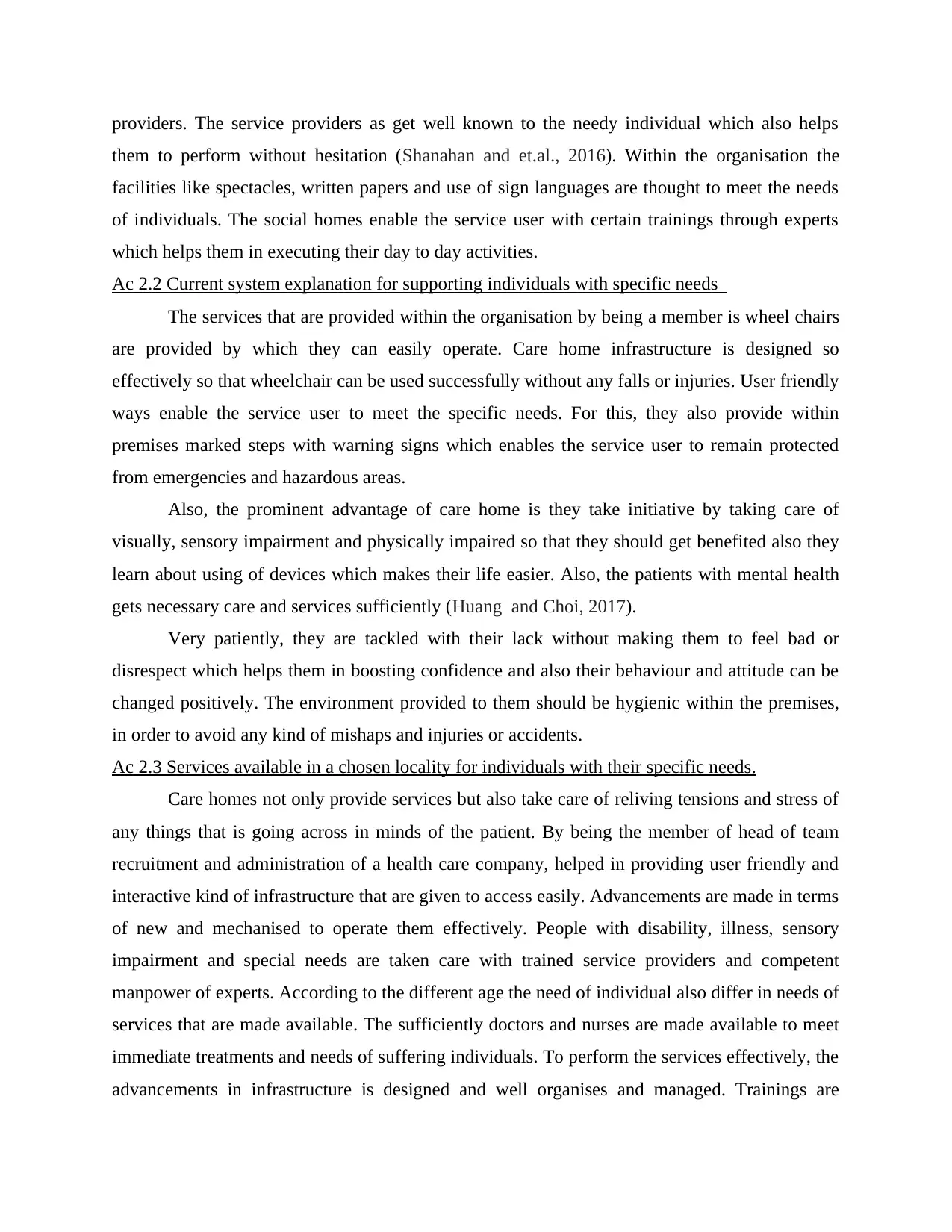
providers. The service providers as get well known to the needy individual which also helps
them to perform without hesitation (Shanahan and et.al., 2016). Within the organisation the
facilities like spectacles, written papers and use of sign languages are thought to meet the needs
of individuals. The social homes enable the service user with certain trainings through experts
which helps them in executing their day to day activities.
Ac 2.2 Current system explanation for supporting individuals with specific needs
The services that are provided within the organisation by being a member is wheel chairs
are provided by which they can easily operate. Care home infrastructure is designed so
effectively so that wheelchair can be used successfully without any falls or injuries. User friendly
ways enable the service user to meet the specific needs. For this, they also provide within
premises marked steps with warning signs which enables the service user to remain protected
from emergencies and hazardous areas.
Also, the prominent advantage of care home is they take initiative by taking care of
visually, sensory impairment and physically impaired so that they should get benefited also they
learn about using of devices which makes their life easier. Also, the patients with mental health
gets necessary care and services sufficiently (Huang and Choi, 2017).
Very patiently, they are tackled with their lack without making them to feel bad or
disrespect which helps them in boosting confidence and also their behaviour and attitude can be
changed positively. The environment provided to them should be hygienic within the premises,
in order to avoid any kind of mishaps and injuries or accidents.
Ac 2.3 Services available in a chosen locality for individuals with their specific needs.
Care homes not only provide services but also take care of reliving tensions and stress of
any things that is going across in minds of the patient. By being the member of head of team
recruitment and administration of a health care company, helped in providing user friendly and
interactive kind of infrastructure that are given to access easily. Advancements are made in terms
of new and mechanised to operate them effectively. People with disability, illness, sensory
impairment and special needs are taken care with trained service providers and competent
manpower of experts. According to the different age the need of individual also differ in needs of
services that are made available. The sufficiently doctors and nurses are made available to meet
immediate treatments and needs of suffering individuals. To perform the services effectively, the
advancements in infrastructure is designed and well organises and managed. Trainings are
them to perform without hesitation (Shanahan and et.al., 2016). Within the organisation the
facilities like spectacles, written papers and use of sign languages are thought to meet the needs
of individuals. The social homes enable the service user with certain trainings through experts
which helps them in executing their day to day activities.
Ac 2.2 Current system explanation for supporting individuals with specific needs
The services that are provided within the organisation by being a member is wheel chairs
are provided by which they can easily operate. Care home infrastructure is designed so
effectively so that wheelchair can be used successfully without any falls or injuries. User friendly
ways enable the service user to meet the specific needs. For this, they also provide within
premises marked steps with warning signs which enables the service user to remain protected
from emergencies and hazardous areas.
Also, the prominent advantage of care home is they take initiative by taking care of
visually, sensory impairment and physically impaired so that they should get benefited also they
learn about using of devices which makes their life easier. Also, the patients with mental health
gets necessary care and services sufficiently (Huang and Choi, 2017).
Very patiently, they are tackled with their lack without making them to feel bad or
disrespect which helps them in boosting confidence and also their behaviour and attitude can be
changed positively. The environment provided to them should be hygienic within the premises,
in order to avoid any kind of mishaps and injuries or accidents.
Ac 2.3 Services available in a chosen locality for individuals with their specific needs.
Care homes not only provide services but also take care of reliving tensions and stress of
any things that is going across in minds of the patient. By being the member of head of team
recruitment and administration of a health care company, helped in providing user friendly and
interactive kind of infrastructure that are given to access easily. Advancements are made in terms
of new and mechanised to operate them effectively. People with disability, illness, sensory
impairment and special needs are taken care with trained service providers and competent
manpower of experts. According to the different age the need of individual also differ in needs of
services that are made available. The sufficiently doctors and nurses are made available to meet
immediate treatments and needs of suffering individuals. To perform the services effectively, the
advancements in infrastructure is designed and well organises and managed. Trainings are
⊘ This is a preview!⊘
Do you want full access?
Subscribe today to unlock all pages.

Trusted by 1+ million students worldwide
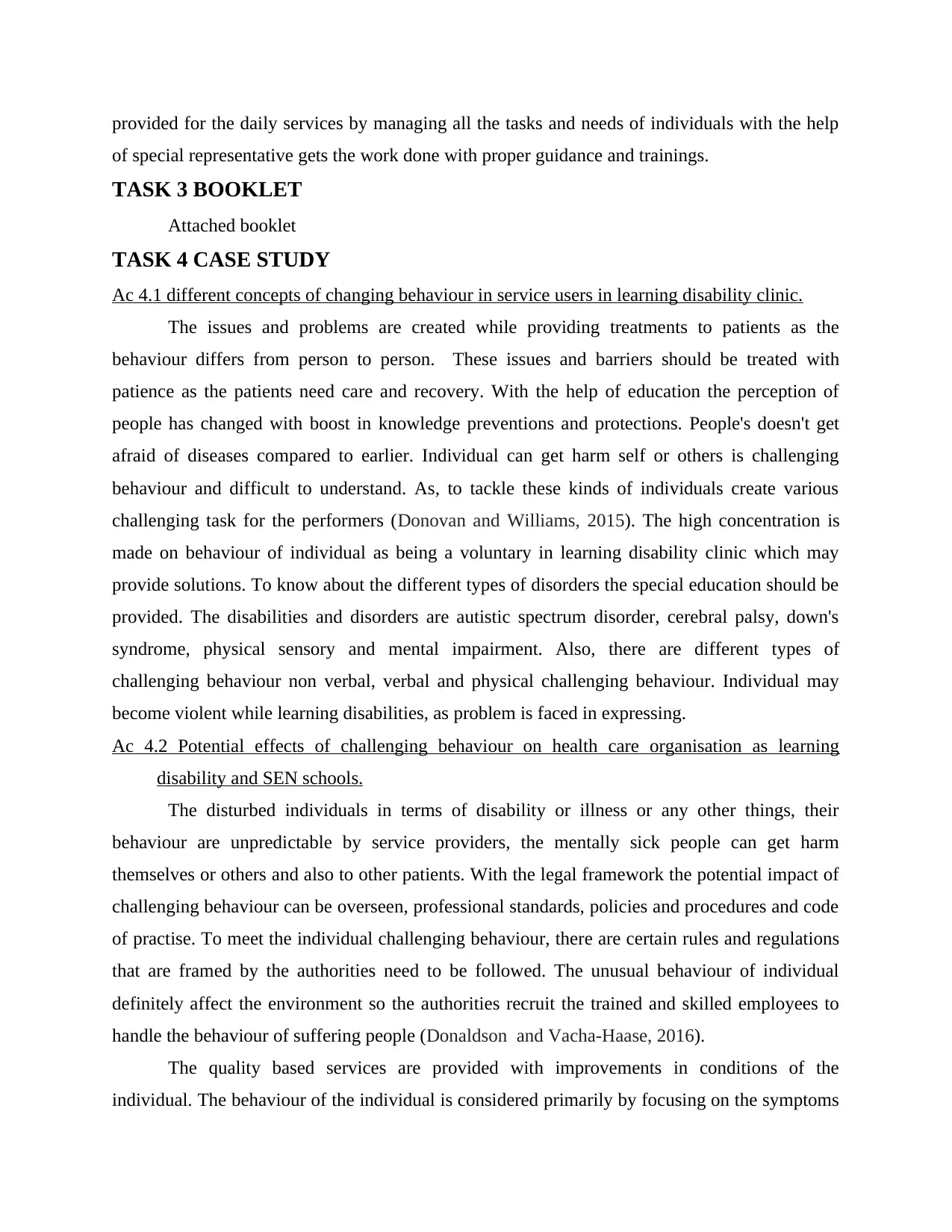
provided for the daily services by managing all the tasks and needs of individuals with the help
of special representative gets the work done with proper guidance and trainings.
TASK 3 BOOKLET
Attached booklet
TASK 4 CASE STUDY
Ac 4.1 different concepts of changing behaviour in service users in learning disability clinic.
The issues and problems are created while providing treatments to patients as the
behaviour differs from person to person. These issues and barriers should be treated with
patience as the patients need care and recovery. With the help of education the perception of
people has changed with boost in knowledge preventions and protections. People's doesn't get
afraid of diseases compared to earlier. Individual can get harm self or others is challenging
behaviour and difficult to understand. As, to tackle these kinds of individuals create various
challenging task for the performers (Donovan and Williams, 2015). The high concentration is
made on behaviour of individual as being a voluntary in learning disability clinic which may
provide solutions. To know about the different types of disorders the special education should be
provided. The disabilities and disorders are autistic spectrum disorder, cerebral palsy, down's
syndrome, physical sensory and mental impairment. Also, there are different types of
challenging behaviour non verbal, verbal and physical challenging behaviour. Individual may
become violent while learning disabilities, as problem is faced in expressing.
Ac 4.2 Potential effects of challenging behaviour on health care organisation as learning
disability and SEN schools.
The disturbed individuals in terms of disability or illness or any other things, their
behaviour are unpredictable by service providers, the mentally sick people can get harm
themselves or others and also to other patients. With the legal framework the potential impact of
challenging behaviour can be overseen, professional standards, policies and procedures and code
of practise. To meet the individual challenging behaviour, there are certain rules and regulations
that are framed by the authorities need to be followed. The unusual behaviour of individual
definitely affect the environment so the authorities recruit the trained and skilled employees to
handle the behaviour of suffering people (Donaldson and Vacha-Haase, 2016).
The quality based services are provided with improvements in conditions of the
individual. The behaviour of the individual is considered primarily by focusing on the symptoms
of special representative gets the work done with proper guidance and trainings.
TASK 3 BOOKLET
Attached booklet
TASK 4 CASE STUDY
Ac 4.1 different concepts of changing behaviour in service users in learning disability clinic.
The issues and problems are created while providing treatments to patients as the
behaviour differs from person to person. These issues and barriers should be treated with
patience as the patients need care and recovery. With the help of education the perception of
people has changed with boost in knowledge preventions and protections. People's doesn't get
afraid of diseases compared to earlier. Individual can get harm self or others is challenging
behaviour and difficult to understand. As, to tackle these kinds of individuals create various
challenging task for the performers (Donovan and Williams, 2015). The high concentration is
made on behaviour of individual as being a voluntary in learning disability clinic which may
provide solutions. To know about the different types of disorders the special education should be
provided. The disabilities and disorders are autistic spectrum disorder, cerebral palsy, down's
syndrome, physical sensory and mental impairment. Also, there are different types of
challenging behaviour non verbal, verbal and physical challenging behaviour. Individual may
become violent while learning disabilities, as problem is faced in expressing.
Ac 4.2 Potential effects of challenging behaviour on health care organisation as learning
disability and SEN schools.
The disturbed individuals in terms of disability or illness or any other things, their
behaviour are unpredictable by service providers, the mentally sick people can get harm
themselves or others and also to other patients. With the legal framework the potential impact of
challenging behaviour can be overseen, professional standards, policies and procedures and code
of practise. To meet the individual challenging behaviour, there are certain rules and regulations
that are framed by the authorities need to be followed. The unusual behaviour of individual
definitely affect the environment so the authorities recruit the trained and skilled employees to
handle the behaviour of suffering people (Donaldson and Vacha-Haase, 2016).
The quality based services are provided with improvements in conditions of the
individual. The behaviour of the individual is considered primarily by focusing on the symptoms
Paraphrase This Document
Need a fresh take? Get an instant paraphrase of this document with our AI Paraphraser
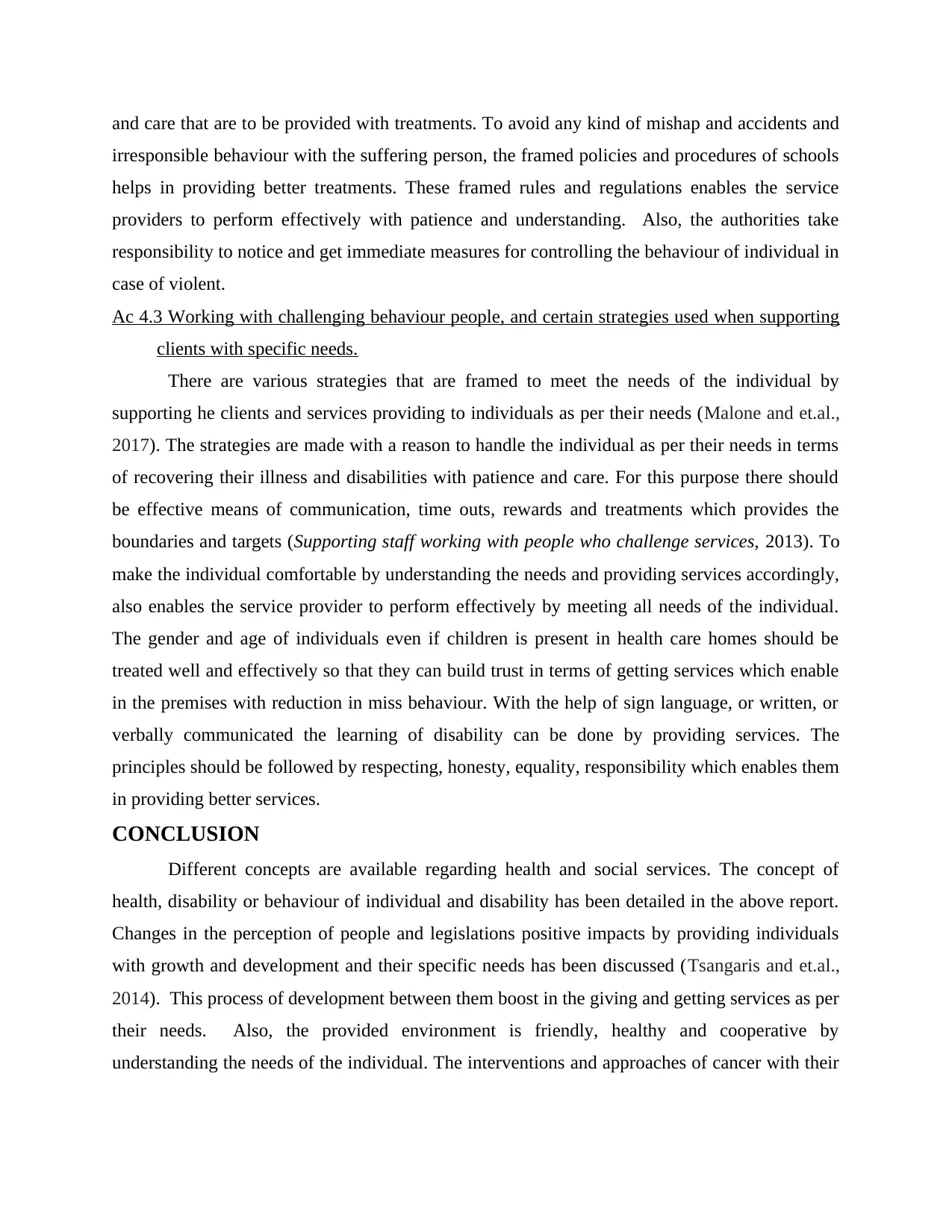
and care that are to be provided with treatments. To avoid any kind of mishap and accidents and
irresponsible behaviour with the suffering person, the framed policies and procedures of schools
helps in providing better treatments. These framed rules and regulations enables the service
providers to perform effectively with patience and understanding. Also, the authorities take
responsibility to notice and get immediate measures for controlling the behaviour of individual in
case of violent.
Ac 4.3 Working with challenging behaviour people, and certain strategies used when supporting
clients with specific needs.
There are various strategies that are framed to meet the needs of the individual by
supporting he clients and services providing to individuals as per their needs (Malone and et.al.,
2017). The strategies are made with a reason to handle the individual as per their needs in terms
of recovering their illness and disabilities with patience and care. For this purpose there should
be effective means of communication, time outs, rewards and treatments which provides the
boundaries and targets (Supporting staff working with people who challenge services, 2013). To
make the individual comfortable by understanding the needs and providing services accordingly,
also enables the service provider to perform effectively by meeting all needs of the individual.
The gender and age of individuals even if children is present in health care homes should be
treated well and effectively so that they can build trust in terms of getting services which enable
in the premises with reduction in miss behaviour. With the help of sign language, or written, or
verbally communicated the learning of disability can be done by providing services. The
principles should be followed by respecting, honesty, equality, responsibility which enables them
in providing better services.
CONCLUSION
Different concepts are available regarding health and social services. The concept of
health, disability or behaviour of individual and disability has been detailed in the above report.
Changes in the perception of people and legislations positive impacts by providing individuals
with growth and development and their specific needs has been discussed (Tsangaris and et.al.,
2014). This process of development between them boost in the giving and getting services as per
their needs. Also, the provided environment is friendly, healthy and cooperative by
understanding the needs of the individual. The interventions and approaches of cancer with their
irresponsible behaviour with the suffering person, the framed policies and procedures of schools
helps in providing better treatments. These framed rules and regulations enables the service
providers to perform effectively with patience and understanding. Also, the authorities take
responsibility to notice and get immediate measures for controlling the behaviour of individual in
case of violent.
Ac 4.3 Working with challenging behaviour people, and certain strategies used when supporting
clients with specific needs.
There are various strategies that are framed to meet the needs of the individual by
supporting he clients and services providing to individuals as per their needs (Malone and et.al.,
2017). The strategies are made with a reason to handle the individual as per their needs in terms
of recovering their illness and disabilities with patience and care. For this purpose there should
be effective means of communication, time outs, rewards and treatments which provides the
boundaries and targets (Supporting staff working with people who challenge services, 2013). To
make the individual comfortable by understanding the needs and providing services accordingly,
also enables the service provider to perform effectively by meeting all needs of the individual.
The gender and age of individuals even if children is present in health care homes should be
treated well and effectively so that they can build trust in terms of getting services which enable
in the premises with reduction in miss behaviour. With the help of sign language, or written, or
verbally communicated the learning of disability can be done by providing services. The
principles should be followed by respecting, honesty, equality, responsibility which enables them
in providing better services.
CONCLUSION
Different concepts are available regarding health and social services. The concept of
health, disability or behaviour of individual and disability has been detailed in the above report.
Changes in the perception of people and legislations positive impacts by providing individuals
with growth and development and their specific needs has been discussed (Tsangaris and et.al.,
2014). This process of development between them boost in the giving and getting services as per
their needs. Also, the provided environment is friendly, healthy and cooperative by
understanding the needs of the individual. The interventions and approaches of cancer with their
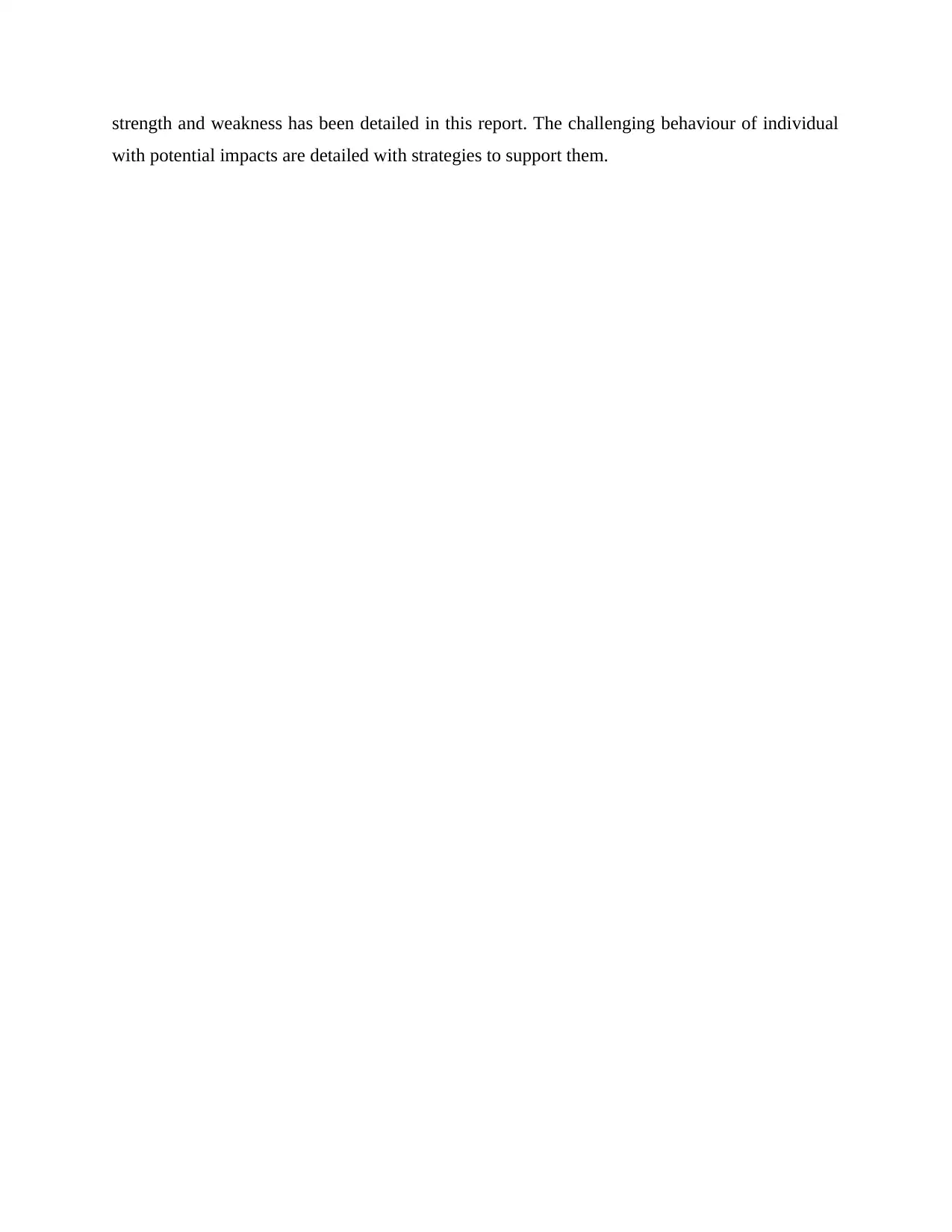
strength and weakness has been detailed in this report. The challenging behaviour of individual
with potential impacts are detailed with strategies to support them.
with potential impacts are detailed with strategies to support them.
⊘ This is a preview!⊘
Do you want full access?
Subscribe today to unlock all pages.

Trusted by 1+ million students worldwide
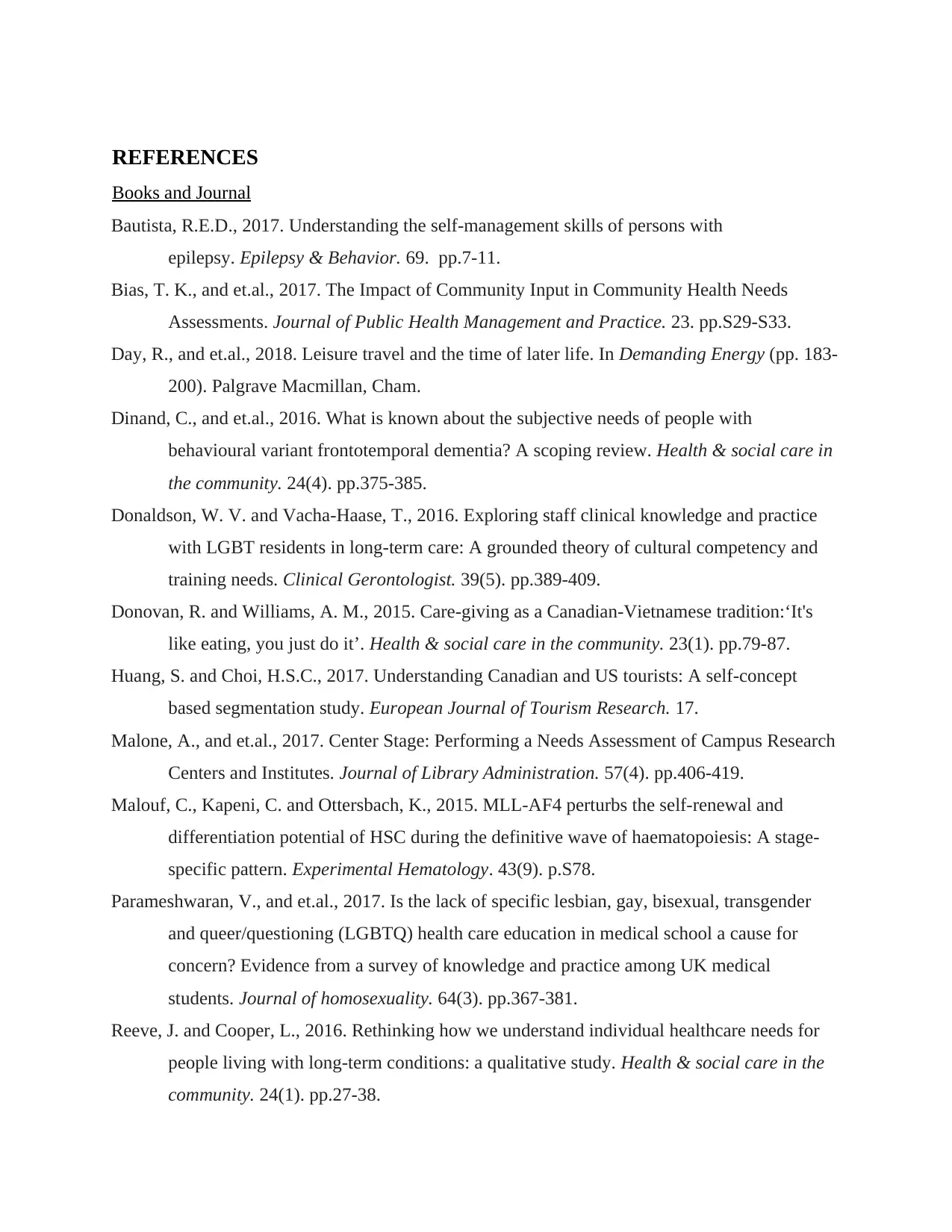
REFERENCES
Books and Journal
Bautista, R.E.D., 2017. Understanding the self-management skills of persons with
epilepsy. Epilepsy & Behavior. 69. pp.7-11.
Bias, T. K., and et.al., 2017. The Impact of Community Input in Community Health Needs
Assessments. Journal of Public Health Management and Practice. 23. pp.S29-S33.
Day, R., and et.al., 2018. Leisure travel and the time of later life. In Demanding Energy (pp. 183-
200). Palgrave Macmillan, Cham.
Dinand, C., and et.al., 2016. What is known about the subjective needs of people with
behavioural variant frontotemporal dementia? A scoping review. Health & social care in
the community. 24(4). pp.375-385.
Donaldson, W. V. and Vacha-Haase, T., 2016. Exploring staff clinical knowledge and practice
with LGBT residents in long-term care: A grounded theory of cultural competency and
training needs. Clinical Gerontologist. 39(5). pp.389-409.
Donovan, R. and Williams, A. M., 2015. Care‐giving as a Canadian‐Vietnamese tradition:‘It's
like eating, you just do it’. Health & social care in the community. 23(1). pp.79-87.
Huang, S. and Choi, H.S.C., 2017. Understanding Canadian and US tourists: A self-concept
based segmentation study. European Journal of Tourism Research. 17.
Malone, A., and et.al., 2017. Center Stage: Performing a Needs Assessment of Campus Research
Centers and Institutes. Journal of Library Administration. 57(4). pp.406-419.
Malouf, C., Kapeni, C. and Ottersbach, K., 2015. MLL-AF4 perturbs the self-renewal and
differentiation potential of HSC during the definitive wave of haematopoiesis: A stage-
specific pattern. Experimental Hematology. 43(9). p.S78.
Parameshwaran, V., and et.al., 2017. Is the lack of specific lesbian, gay, bisexual, transgender
and queer/questioning (LGBTQ) health care education in medical school a cause for
concern? Evidence from a survey of knowledge and practice among UK medical
students. Journal of homosexuality. 64(3). pp.367-381.
Reeve, J. and Cooper, L., 2016. Rethinking how we understand individual healthcare needs for
people living with long‐term conditions: a qualitative study. Health & social care in the
community. 24(1). pp.27-38.
Books and Journal
Bautista, R.E.D., 2017. Understanding the self-management skills of persons with
epilepsy. Epilepsy & Behavior. 69. pp.7-11.
Bias, T. K., and et.al., 2017. The Impact of Community Input in Community Health Needs
Assessments. Journal of Public Health Management and Practice. 23. pp.S29-S33.
Day, R., and et.al., 2018. Leisure travel and the time of later life. In Demanding Energy (pp. 183-
200). Palgrave Macmillan, Cham.
Dinand, C., and et.al., 2016. What is known about the subjective needs of people with
behavioural variant frontotemporal dementia? A scoping review. Health & social care in
the community. 24(4). pp.375-385.
Donaldson, W. V. and Vacha-Haase, T., 2016. Exploring staff clinical knowledge and practice
with LGBT residents in long-term care: A grounded theory of cultural competency and
training needs. Clinical Gerontologist. 39(5). pp.389-409.
Donovan, R. and Williams, A. M., 2015. Care‐giving as a Canadian‐Vietnamese tradition:‘It's
like eating, you just do it’. Health & social care in the community. 23(1). pp.79-87.
Huang, S. and Choi, H.S.C., 2017. Understanding Canadian and US tourists: A self-concept
based segmentation study. European Journal of Tourism Research. 17.
Malone, A., and et.al., 2017. Center Stage: Performing a Needs Assessment of Campus Research
Centers and Institutes. Journal of Library Administration. 57(4). pp.406-419.
Malouf, C., Kapeni, C. and Ottersbach, K., 2015. MLL-AF4 perturbs the self-renewal and
differentiation potential of HSC during the definitive wave of haematopoiesis: A stage-
specific pattern. Experimental Hematology. 43(9). p.S78.
Parameshwaran, V., and et.al., 2017. Is the lack of specific lesbian, gay, bisexual, transgender
and queer/questioning (LGBTQ) health care education in medical school a cause for
concern? Evidence from a survey of knowledge and practice among UK medical
students. Journal of homosexuality. 64(3). pp.367-381.
Reeve, J. and Cooper, L., 2016. Rethinking how we understand individual healthcare needs for
people living with long‐term conditions: a qualitative study. Health & social care in the
community. 24(1). pp.27-38.
Paraphrase This Document
Need a fresh take? Get an instant paraphrase of this document with our AI Paraphraser
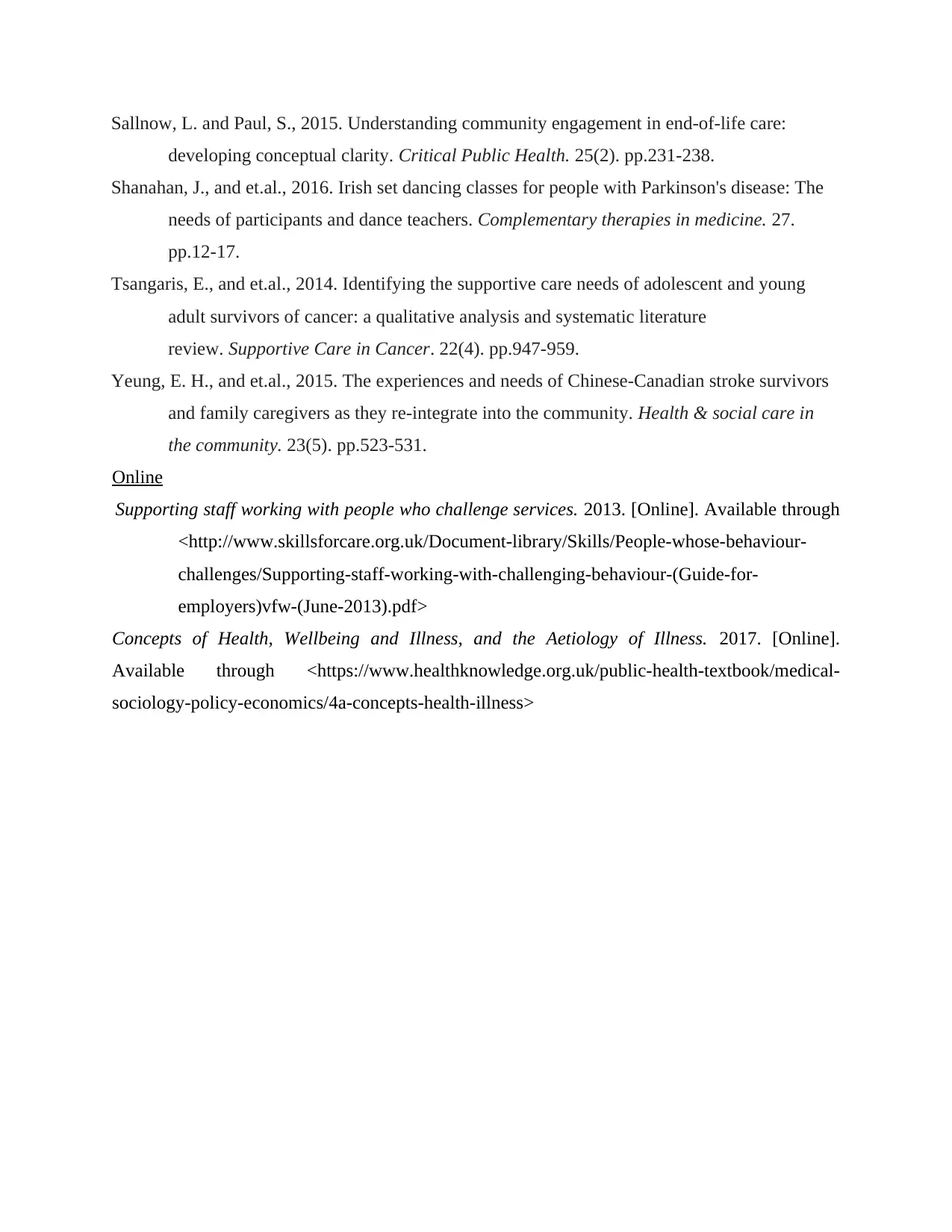
Sallnow, L. and Paul, S., 2015. Understanding community engagement in end-of-life care:
developing conceptual clarity. Critical Public Health. 25(2). pp.231-238.
Shanahan, J., and et.al., 2016. Irish set dancing classes for people with Parkinson's disease: The
needs of participants and dance teachers. Complementary therapies in medicine. 27.
pp.12-17.
Tsangaris, E., and et.al., 2014. Identifying the supportive care needs of adolescent and young
adult survivors of cancer: a qualitative analysis and systematic literature
review. Supportive Care in Cancer. 22(4). pp.947-959.
Yeung, E. H., and et.al., 2015. The experiences and needs of Chinese‐Canadian stroke survivors
and family caregivers as they re‐integrate into the community. Health & social care in
the community. 23(5). pp.523-531.
Online
Supporting staff working with people who challenge services. 2013. [Online]. Available through
<http://www.skillsforcare.org.uk/Document-library/Skills/People-whose-behaviour-
challenges/Supporting-staff-working-with-challenging-behaviour-(Guide-for-
employers)vfw-(June-2013).pdf>
Concepts of Health, Wellbeing and Illness, and the Aetiology of Illness. 2017. [Online].
Available through <https://www.healthknowledge.org.uk/public-health-textbook/medical-
sociology-policy-economics/4a-concepts-health-illness>
developing conceptual clarity. Critical Public Health. 25(2). pp.231-238.
Shanahan, J., and et.al., 2016. Irish set dancing classes for people with Parkinson's disease: The
needs of participants and dance teachers. Complementary therapies in medicine. 27.
pp.12-17.
Tsangaris, E., and et.al., 2014. Identifying the supportive care needs of adolescent and young
adult survivors of cancer: a qualitative analysis and systematic literature
review. Supportive Care in Cancer. 22(4). pp.947-959.
Yeung, E. H., and et.al., 2015. The experiences and needs of Chinese‐Canadian stroke survivors
and family caregivers as they re‐integrate into the community. Health & social care in
the community. 23(5). pp.523-531.
Online
Supporting staff working with people who challenge services. 2013. [Online]. Available through
<http://www.skillsforcare.org.uk/Document-library/Skills/People-whose-behaviour-
challenges/Supporting-staff-working-with-challenging-behaviour-(Guide-for-
employers)vfw-(June-2013).pdf>
Concepts of Health, Wellbeing and Illness, and the Aetiology of Illness. 2017. [Online].
Available through <https://www.healthknowledge.org.uk/public-health-textbook/medical-
sociology-policy-economics/4a-concepts-health-illness>

⊘ This is a preview!⊘
Do you want full access?
Subscribe today to unlock all pages.

Trusted by 1+ million students worldwide
1 out of 12
Related Documents
Your All-in-One AI-Powered Toolkit for Academic Success.
+13062052269
info@desklib.com
Available 24*7 on WhatsApp / Email
![[object Object]](/_next/static/media/star-bottom.7253800d.svg)
Unlock your academic potential
Copyright © 2020–2026 A2Z Services. All Rights Reserved. Developed and managed by ZUCOL.





